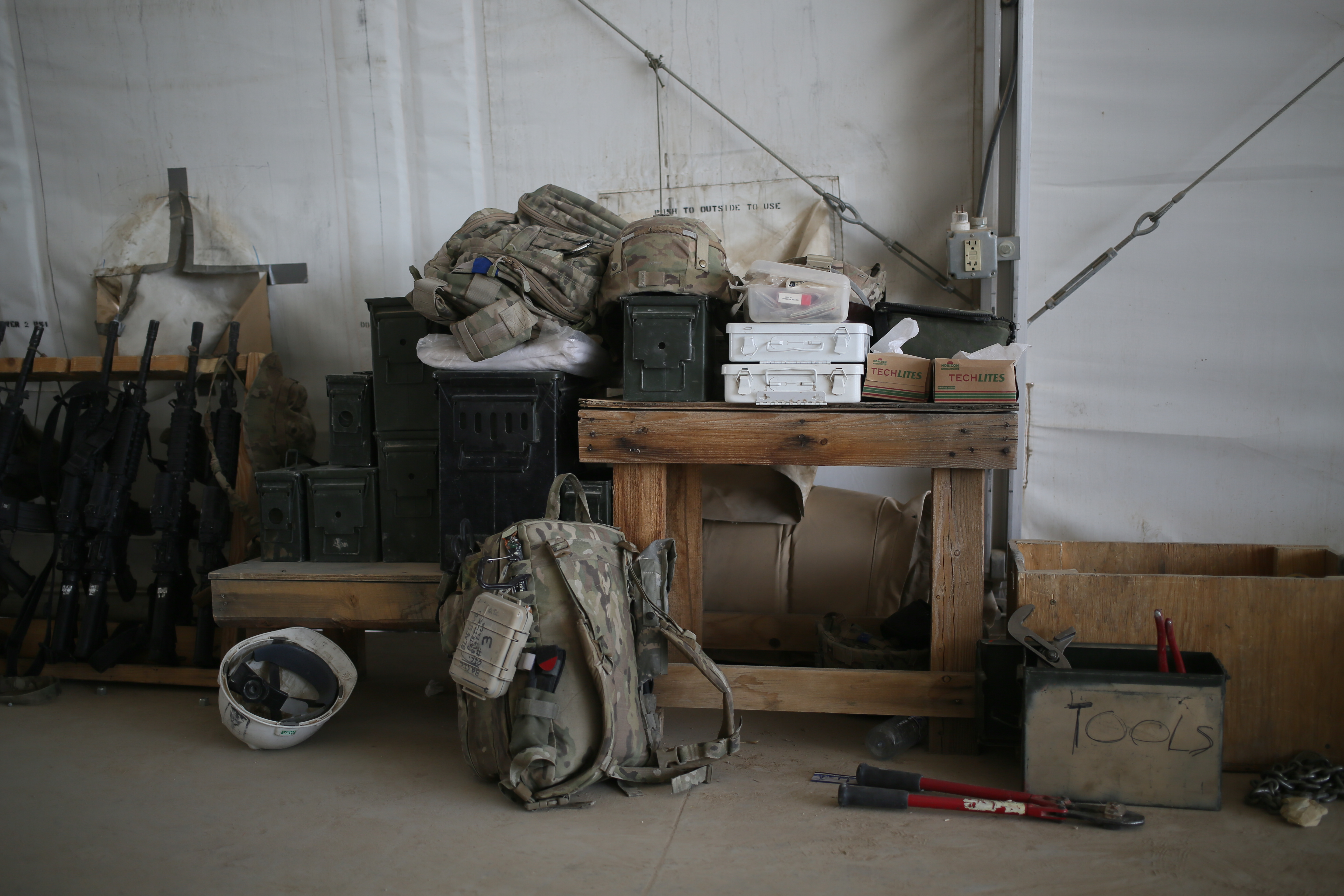Camp Marmal, Afghanistan — It is said jokingly, but with an edgy nervousness.
Wisconsin National Guard troops in Afghanistan wonder whether they'll get sent to Iraq next.
Though President Barack Obama and military leaders say there will be only limited involvement in shoring up the country, soldiers are not so sure.
"We talk about that all the time," said Spc. Jasen Pomroy, 44, of Baldwin. "I don't think we want to get into another one if we're trying to finish this one out. Where's it going to end?"
Pomroy worked in a route clearance unit in Iraq in 2010-'11. Many other members of the Wisconsin National Guard's 829th Engineer Co., now stationed in Afghanistan, are Iraq veterans.
They monitor news of the U.S. airstrikes on Islamic State fighters, the potential ramping up of troops to Baghdad, the execution of journalist and Marquette University graduate James Foley, and they wonder where it will lead.
Staff Sgt. Rodney Howard, 38, of Marion, Iowa, served in Iraq in 2004-'05 and 2006-'07, as well as in Kuwait and Bosnia. He spent time helping train Iraqi security forces and has watched with dismay as those forces were quickly overrun.
"It's frustrating for all of us who put our lives on the line, and it's back to what it was or worse," said Howard, who joined the Wisconsin National Guard three years ago.
"Our economy suffered, our soldiers suffered, our military families and children suffered. It makes you think: Did we do what was necessary to have them stand up on their own? I saw pictures of (Islamic State terrorists) with brand-new vehicles and brand-new M-4 weapons, just like ours. Who's funding them? Who's giving them all this equipment?"
Hope for Afghanistan
Sgt. 1st Class R.W. Lemmons, 33, of New Auburn, was in Iraq with the Wisconsin National Guard's 724th Engineers in 2003-'04, when the unit built base camps in the middle of the desert, paved roads and performed road improvements in Basra. He also served in Kuwait in 2005-'06 with a field artillery unit.
"You'd like to see peace everywhere. Is that possible?" asked Lemmons, who works for a frac sand mining company near Bloomer. "It's possible what I did (in Iraq) in '03-'04 made it more stable for a period of time. But what's happening now, I don't know....."
Staff Sgt. Anthony Fiecke, 33, who lived in Ashland and Eau Claire, served two tours in Iraq, with the 724th Engineers in 2003-'04 and in 2009-'10 when the unit handled detainee operations. He's surprised how quickly Iraqi security forces were defeated, particularly after years of training by U.S. and coalition forces who acted as mentors in the hopes that a strong police and army could make Iraq secure.
"I thought they'd be able to sustain themselves," said Fiecke, who works as a service manager at a North Dakota car dealership. "I wish we weren't (going back to Iraq). I hope whatever action is taken is slow and deliberate and well thought out."
The chaos erupting in Iraq also leads to a thorny subject: What will happen in Afghanistan now that combat operations are shutting down by the end of the year? Will the land on which Wisconsin soldiers now are taking down the remnants of America's longest war become the site of bloodshed in years ahead?
Howard, who lost a friend on his last mission in Iraq, is hoping for the best.
"I don't know the political structure of Afghanistan, but I don't think things will be as severe as they are in Iraq," he said. "Afghanistan seems like it has more of a grasp of its security and police forces."
Memories of a friend
Staff Sgt. Tom Hinman, 51, of Hazel Green, arrived in Iraq in late spring 2003, also with the 724th Engineers.
He traveled through Baghdad, Balad and Mosul and was stationed in Nasiriyah, where he saw unrest among soldiers in the Iraqi army who hadn't received paychecks. Hinman felt the Iraqi soldiers were in poor shape and weak; still, he felt that he accomplished something on that first trip.
"Of all the deployments, that was probably the most rewarding," said Hinman, who returned to Iraq later in the war as director of public works in Baghdad for the U.S. military.
Now a security consultant for a Dubuque, Iowa company, and a former Wisconsin National Guard company commander, Hinman shared the story of a University of Wisconsin-Platteville ROTC classmate who went through engineering school with him.
Maj. Christopher Splinter died on Christmas Eve 2003 when his vehicle was hit by an improvised explosive device near Samarra. Shortly before his death, Splinter wrote to his parents, sharing his hopes for the future.
"We will be successful, but must dig in our heels for the long term," Splinter wrote. "Ten years from now, Iraq will be the show state in the Middle East. This is dependent on America not losing hope and forcing the army to depart early."
Sitting in a dusty office chair inside an aviation hangar soon to be removed by his work crew, Hinman's voice faltered as he remembered his friend.
"It kind of makes you mad. We did all this stuff over there, building bases and roads — was it worth it? I did a lot of tours over there, and each time the satisfaction was less and less."














